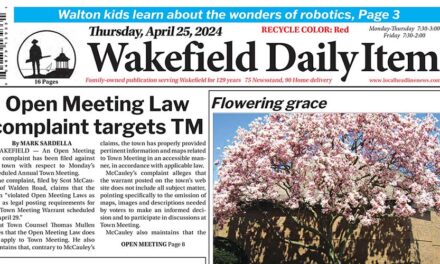Published in the February 2, 2016 edition.
WAKEFIELD — Wakefield educators are performing at levels comparable to or better than their counterparts statewide, according to evaluation data released last week by the Massachusetts Department of Education for the 2014-2015 school year. According to the study, 96 percent of Wakefield educators are performing at “proficient” levels or better, the same percentage so-rated statewide.
Wakefield educators exceeded their statewide colleagues in the “proficient” category, with 89 percent rated “proficient” compared to 85.9 percent statewide. Of the 300 Wakefield educators evaluated, 7 percent received ratings of “exemplary,” compared to 9.6 percent statewide that were so rated.
Four percent of Wakefield’s educators “need improvement,” according to the study, compared to 4.1 percent in the state. No Wakefield teachers were assigned “unsatisfactory” ratings, while 0.4 percent of teachers statewide were given “unsatisfactory” marks.
Superintendent of Schools Kim Smith was pleased with Wakefield’s showing.
“Proficient is the rigorous expected level of performance, a level of performance that is demanding but attainable, ultimately the standard set for effective teaching practice in the Wakefield Public Schools,” Smith said. “Congratulations to the WPS staff.”
The DOE also broke out evaluation data on the performance of school administrators. Statewide, 14.4 percent were rated Exemplary, 82.0 percent were Proficient, 3.4 percent were Needs Improvement and 0.2 percent were Unsatisfactory.
Of the 16 Wakefield school administrators evaluated, 18.8 percent were rated Exemplary, 75 percent were proficient, 6.3 percent Needs Improvement and 0 were rated Unsatisfactory.
The DOE’s evaluation ratings were produced under the state Educator Evaluation Framework. Over 79,000 educators in 366 districts participated. Due to the staggered rollout of the state’s educator evaluation requirements, 2014-15 marked the first year that all educators in all districts were expected to participate.
“The state’s evaluation framework is designed to ensure teachers and administrators receive meaningful feedback to help them serve students better,” according to a DOE statement. “The ratings released last week represent a tremendous effort by administrators and teachers to build and implement systems of support and evaluation aligned to the state framework and to use these systems to improve their practice.”
Statewide, early findings suggest that districts are using the framework to identify high-performing educators, who they then retain at promising levels, while shortening timelines for struggling educators to improve. Over 88 percent of teachers who earned Exemplary or Proficient ratings during the 2012-13 school year were still working in Massachusetts schools two years later. This is compared to 46 percent of teachers rated Unsatisfactory who are still working in Massachusetts schools two years later. The data also reflects improvement among lower-performing educators: Over 80 percent of teachers rated Needs Improvement or Unsatisfactory in 2012-13 who were rated in 2014-15 improved their performance ratings to Proficient or Exemplary. Taken together, these findings indicate that Massachusetts’ educator workforce continues to get stronger, according to the DOE.
Most educators continued to earn Proficient ratings (85.9 percent in 2014-15 compared to 86.5 percent in 2013-14). Proficient is a solid, expected level of performance. Top ratings are reserved for truly outstanding performers: 9.6 percent of educators received Exemplary ratings (compared to 8.1 percent in 2013-14). Smaller percentages of educators received ratings of Needs Improvement (4.1 percent, compared to 4.8 percent in 2013-14) and Unsatisfactory (0.4 percent compared to 0.5 percent in 2013-14). These educators are receiving additional support this year to promote rapid improvement.
“Students learn more when they have strong, well-supported teachers and administrators,” said Elementary and Secondary Education Commissioner Mitchell D. Chester. “Meaningful evaluations help educators improve and inform efforts to ensure that all students are taught by skillful, effective teachers.”
In 2011, the Board of Elementary and Secondary Education adopted new regulations for the evaluation of all Massachusetts educators. The state created a framework for these evaluations but each district can tailor the framework to meet its needs.
The regulations provide educators with greater feedback and opportunities to support their improvement while also shortening the timelines for improvement. The regulations also set a high bar for teacher tenure.
Under the framework, every educator is an active participant in her or his own evaluation. The process promotes collaboration and continuous learning and emphasizes professional conversations about teaching and learning. The goal is to provide opportunities for even the most expert educators to improve their practice by working with their colleagues and evaluators. For educators who are in need of improvement, the system provides the opportunity to grow.
Evaluators rate educators using multiple categories of evidence, including observations, multiple measures of student learning and evidence linked to effective practice, such as samples of student work, lesson plans and materials showing engagement with families.
Every educator evaluated in 2014-15 received a Summative Performance Rating of Exemplary, Proficient, Needs Improvement or Unsatisfactory. The summative rating determines the type of educator plan an educator is placed on for the next cycle. Experienced, effective educators are placed on educator plans of a longer duration that offer them more autonomy. Plans are designed to provide educators with meaningful feedback and support. The types of plans include:
Self-Directed Growth Plan – a one- or two-year plan for experienced educators who were rated Proficient or Exemplary.
Directed Growth Plan – a plan up to one year in length for educators rated Needs Improvement.
Improvement Plan – a plan of 30 calendar days up to one school year for educators rated Unsatisfactory.
Developing Educator Plan – a one-year plan for educators without Professional Teaching Status (also known as tenure), administrators in their first three years in a district or at the discretion of an evaluator for an educator in a new assignment.
Eventually, educators will receive two ratings, a Summative Performance Rating and a Student Impact Rating (High, Moderate or Low). The Student Impact Rating must be informed by at least two years of data that includes student growth percentiles from state assessments when possible and by common measures chosen at the district level; those are referred to as district-determined measures. Some districts will begin issuing Student Impact Ratings following the 2015-16 school year, after trends and patterns across
multiple measures have been
established.
In Massachusetts, student results do not make up a particular percent of an educator’s evaluation and in every evaluation the evaluator’s professional judgment is the overriding factor. The Commonwealth’s two-rating educator evaluation framework is unique and reflects the importance of providing educators with meaningful feedback about both their practice and their impact on student learning to supporting their professional growth.
Other 2014-15 statewide results were broken down as follows::
All Educators: Statewide, 9.6 percent were rated Exemplary, 85.9 percent were Proficient, 4.1 percent were Needs Improvement, and 0.4 percent were Unsatisfactory.
Principals: Statewide, 13.4 percent were rated Exemplary, 82.5 percent were Proficient, 3.9 percent were Needs Improvement and 0.3 percent were Unsatisfactory.
Teachers – Professional Teacher Status: Statewide, 10.1 percent were rated Exemplary, 87.1 percent were Proficient, 2.4 percent were Needs Improvement and 0.4 percent were Unsatisfactory.
Teachers – Non-Professional Teacher Status: Statewide, 4.1 percent were rated Exemplary, 85.4 percent were Proficient, 9.9 percent were Needs Improvement and 0.6 percent were Unsatisfactory.
Per state law, individual evaluation data submitted to ESE is considered personnel information and is confidential and not subject to disclosure under the public records law. The exception is data for superintendents, whose annual evaluations are a matter of public record.
For school- and district-level evaluation data, visit https://profiles.doe.mass.edu/state_report/educatorevaluationperformance.aspx. For more information on educator evaluation, go to https://www.doe.mass.edu/edeval.




